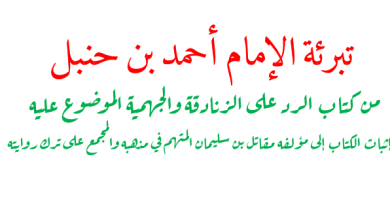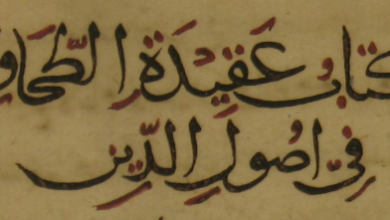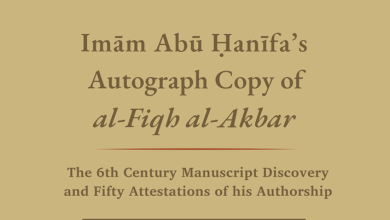Various Quotes Regarding Allah & His Attributes Ascribed to Imam Ahmad by the ‘Ulema
ON ATTRIBUTING A BODY (JISM) TO ALLAH
[The Imam and hadith master (hafiz) Ahmad Ibn Al-Husayn] Al-Bayhaqi (d. 458/1066) relates in his Manaqib al-Imam Ahmad [The memorable actions of Imam Ahmad] with his chain on the authority of Abu al-Fadl that he said:“[Imam] Ahmad censured the one who believed in corporeality [qala bi al-jism], saying, ‘The Names of things are taken from the Shari’a and the Arabic language. The language’s possessors have used this word [body] for something that has height, breadth, thickness, construction, form, and composition, while Allah Most High is beyond all of that, and may not be termed a “body” because of being beyond any meaning of embodiedness. This has not been conveyed by the Shari’a, and so is refuted ‘ ” source
وروى البيهقي في مناقب الإمام أحمد بسنده عن أبي الفضل هذا أنه قال :”أنكر أحمد على من قال بالجسم وقال إن الأسماء مأخوذة من الشريعة واللغة، وأهل اللغة وضعوا هذا الإسم على ذي طول وعرض وسمك وتركيب وصورة وتأليف ، والله تعالى خارج عن ذلك كله فلم يجز أن يسمى جسماً لخروجه عن معنى الجسمية ولم يجيء في الشريعة ذلك فبطل .”
Imam Ahmad Ibn Hanbal said: ‘The one who says Allah is a body not like other bodies Blasphemes’.
[Narrated by Abu Muhammad al Baghdadi in his book Al Khisal and Badr al-Din al-Zarkashi in his book Tashnif Al Masami’ source]Similarly, Hafiz al-Bayhaqi quotes Imam Ahmad in Manaqib Ahmad: “A person commits an act of disbelief (kufr) if he says Allah is a body, even if he says: Allah is a body but not like other bodies.” source]
ON ATTRIBUTING LIMBS TO ALLAH
In I’tiqad Imam Ahmad bi Riwaya Tamimi (page 4) the Imam is quoted as saying:
Allah ta’ala has Yadayn. They are attributes of His Essence which are not two limbs, nor two composite parts, nor a body…
وكان يقول إن لله تعالى يدين وهما صفة له في ذاته ليستا بجارحتين وليستا بمركبتين و لا جسم ولا من جنس الأجسام ولا من جنس المحدود والتركيب ولا الأبعاض والجوارح
[Ahmad’s] disciples reported that one day a man recited Q 39:67 (The earth altogether shall be His handful . . .) and while reciting, pointed at his own fist. Ahmad was angry with the man, and cursed him, saying that God would cut off his hand.(Ahmad b. hanbal, Masail, 1:307-8).
In another report, Ahmad b. hanbal and Dawud b. Ali al-Isfahani (d. 270/884) said that whoever moved his hand while reciting Q 38:75 (. . . that I created with My own hands?), or made a gesture using his two fingers while transmitting “the heart of the believer is between two of the Merciful’s fingers,” must have his hand cut off [in the first case] and his finger detached [in the second]
(Al-Shahrastani, Milal, 1:104). source
ON ASCRIBING LIMITS TO ALLAH
Al-Khallal reports from Imam Ahmad:
Allāh has a Throne and the Throne has carriers carrying it while Allāh is on His Throne although He has no limit, and Allāh knows best its limit.
[Ahmad ibn Hanbal, al-Aqīda Riwayata Abī Bakr al-Khallāl, ed. Abd al-Azīz Izz al-Dīn al-Sayrawan (Damascus: Dār Qutayba, 1988) p. 78.]Hanbal ibn Ishāq, the Imām’s cousin reports from Imam Ahmad:
Allāh is not to be described more than whatever He described Himself with, or His Prophet described Him with, without limit nor delimitation (bilā h.addin walā ghāya)
[Narrated by Ibn Qudāma in Dhamm al-Ta’wīl (p. 20 #32)]and also via Hanbal, We believe that Allāh is on the Throne in the manner He wishes and however He wishes, without limit nor description anyone could give or define Him by.
[Narrated by Abū Ya’lā in Ibtāl al-Ta’wīl per Ibn Taymiyya, Bayān Talbīs (2:173).]and, in commentary of the verse “And He is with you wheresoever you may be (57:4): [I.e.] His knowledge. His knowledge encompasses all, and our Lord is over the Throne without limit (bilā h.add) nor description.
[Narrated by al-Dhahabī cf. Mukhta.sar al-‘Uluw (p. 190 #229) and by al-Lālikāī.]ON ASCRIBING CHANGE (& LIMITS) TO ALLAH
Abū al-Fadl al-Tamīmī narrates from Imam Ahmad: Allāh is not subject to change, substitution, nor limits, whether before or after the creation of the Throne.
[Narrated by Ibn Abī Ya’lā, Tabaqāt al-Hanābila (2:296-297).] source
POSITION TOWARDS THE ‘ATTRIBUTE’ VERSES
Ibn Qudama in his Lum’at al-I’tiqad narrates:
Imam Abu `Abdullah Ahmad b. Muhammad b. Hanbal – may Allah be pleased with him – has said regarding the Prophet’s statements – sallallahu ‘alayhi wa sallam- that Allah descends to the lowest heaven, that Allah will be seen on the day of Resurrection, and what resembles such statements. “We have faith and believe in them without [saying] how [is their modality] or [interpreting their] meaning. We do not reject any of [these reports]. We know that what the Messenger came with is the truth. We do not reject what the Messenger of Allah – sallallahu ‘alayhi wa sallam – has brought. Nor do we describe Allah with more than what He has described Himself without [ascribing to Him] a limit or an end. ‘Like Him there is naught. And He is the All-hearing, the All-seeing.’ (42:1 1). We say as He has said and we describe Him as He has described Himself. We do not transgress that. The descriptions of men do not reach Him. We believe in the whole of the Qur’an – its definitive (mukham) and its equivocal (mutashabih). We do not separate from Him any of His attributes due to the protests of anyone. We do not transgress the Qur’an and the hadith. Nor do we know the reality of [these attributes] except by believing the Messenger – sallallahu `alayhi wa sallam – and affirming the Qur’an.”
قال الإمام أبو عبد الله أحمد بن محمد بن حنبل رضي الله عنه في قول النبي صلى الله عليه وسلم إن الله ينزل الى سماء الدنيا و إن الله يرى في القيامة وما أشبه هذه الأحاديث نؤمن بها ونصدق بها لا كيف ولا معنى ولا نرد شيئا منها ونعلم أن ما جاء به الرسول حق ولا نرد على رسول الله صلى الله عليه وسلم ولا نصف الله بأكثر مما وصف به نفسه بلا حد ولا غاية (ليس كمثله شيء وهو السميع البصير) الشورى 11 ونقول كما قال ونصفه بما وصف به نفسه لا نتعدى ذلك ولا يبلغه وصف الواصفين نؤمن بالقرآن كله محكمه ومتشابهه ولا نزيل عنه صفة من صفاته لشناعة شنعت ولا نتعدى القرآن والحديث ولا نعلم كيف كنه ذلك إلا بتصديق الرسول صلى الله عليه وسلم وتثبيت القرآن .
source
HIS TA’WIL OF CERTAIN VERSES
The Qadi Abu Ya’la reported Ahmad b. Hanbal as having said that the verse “Allah will come to them” means that [he will come to them] through His power (qudra) and His command (amr), and in support of this interpretation he cited the verse “The command of your Lord (amru rabbika) will come.” The expression “Your Lord will come,” which is also found in the Torah, [was explained by Ahmad as meaning that] it is His power (qudra) only [that will come].
[Ibn al-Jawzi, Daf Shubah al-Tashbih; c.f Ibn Hazm in al-Fisal 2:173]وكلامه في نفي التشبيه وترك الخوض في الكلام والتمسك بما ورد في الكتاب والسنة عن النبي صلى الله عليه وسلم وعن أصحابه.
وروى البيهقي عن الحاكم عن أبي عمرو بن السماك عن حنبل أن أحمد بن حنبل تأول قول الله تعالى: (وجاء ربك) [ الفجر: 22 ] أنه جاء ثوابه.
ثم قال البيهقي: وهذا إسناد لا غبار عليه.
Regarding the verse:
“And your Lord shall come . . .” (Qur’an 89:22),
Hafiz al-Bayhaqi narrates Imam Ahmad explaining its meaning as “His recompense (thawab) shall come.”
Al-Bayhaqi adds, “This chain of narrators has absolutely nothing wrong in it”
[al-Bidaya wa al-nihaya,10.342; c.f. Ibn al-Jawzi in Daf Shubah al-Tashbih source]
ON ALLAH’S SPEECH
Imam Ahmad was asked: “{Never comes there unto them a new (muhdath) reminder from their Lord} (21:2). Can something new be anything but created?”
He replied: “Allah said: {Sad. By the Qur’an that contains the Reminder} (38:1). ‘The’ reminder is the Qur’an, while the other verse does not say ‘the’.”
[Narrated by Abu `Uthman al-Sabuni from Salih ibn Ahmad ibn Hanbal from his father in Sirat al-Imam (p. 38).]Another version states that he answered: “It is possible that it is the Qur’an’s revelation to us (tanziluhu ilayna) that is muhdath, not the dhikr itself.”
[Both narrated by al-Bayhaqi cf. Ibn Kathir in al-Bidaya (10:342-343).]Ibn Kathir has written in his al-Bidayah wa Nihayah 10/361:
وروى البيهقي من طريق إسماعيل بن محمد بن إسماعيل السلمي عن أحمد أنه قال: من قال: القرآن محدث فهو كافر.
Al-Bayhaqi has narrated through the route of Ismail ibn Muhammad ibn Ismail al-Salami from Ahmad that he said:
Whoever calls the Qur’an a muhdath is a kafir!
Something Ibn Shaddad had written was handed to Abu Bakr al-Marwazi which contained the phrase: “My pronunciation of the Qur’an is uncreated” and the latter was asked to show it to Ahmad ibn Hanbal for corroboration. The latter crossed out the phrase and wrote instead: “The Qur’an, however used (haythu yusraf), is uncreated.” (1)
In another sound narration, Abu Bakr al-Marwazi, Abu Muhammaed Fawran [or Fawzan], and Salih ibn Ahmad ibn Hanbal witnessed Ahmad rebuking one of his students named Abu Talib with the words: “Are you telling people that I said: ‘My pronunciation of the Qur’an is uncreated’?” Abu Talib replied: “I only said this from my own.” Ahmad said: “Do not say this – neither from me, nor from you! I never heard any person of knowledge say it. The Qur’an is Allah’s speech uncreated, whichever way it is used.” Salih said to Abu Talib: “If you told people what you said, now go and tell the people that Abu ‘Abd Allah [Imam Ahmad] forbade to say it.” (2) source
—————–
(1) AS (p. 265); ASG (2:18). Narrated with a sound chain by Bayhaqi. Al-Kawthari commented on this and the next narration as follows: “Due to such equivocal expressions, many of Ahmad’s companions erroneously thought that anything remotely connected with the Qur’an is pre-eternal (qadim). Bukhari said in Khalq Af’al al-Ibad : ‘ As for what the two parties from the school of Ahmad have claimed as proof, each for his own position: Much of what they relate is not established as authentic. It is probably they did not comprehend the subteleness of his postion. What is known from Ahmad and the people of knowledge is that Allah’s speech is uncreated and all else is created. But they hated to discuss and explore obscure matters, avoiding dialectic theologians and their queries and disputations, except in what was a matter of knowledge and which the Prophet (s) clarified.’ ”
(2) AS (p.265-266); ASH (2:18) This is a sound narration also found in Salih ibn Ahmad’s book al-Mihna (p. 70-71), Ibn al-Jawzi’s Manaqib al-Imam Ahmad (p.155), and Ibn Taymiya in Majmu’ al-Fatawa (12:360, 12:425)
Thanks to – HERE






